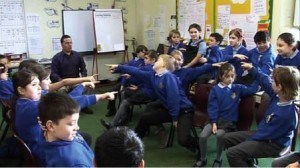So what's P4C?
It's approach to teaching and learning that asks philosophical questions.
It can be done in schools as a standalone lesson, or embedded within your curriculum.
It emerged from the work of Matthew Lipman, a US philosophy professor.
He wanted his undergraduates to think for themselves, not just demand answers they could regurgitate in exams.
The method he developed is now used in over sixty countries with schoolchildren of all ages.
Rather than the teacher asking a question, in a typical P4C enquiry, children are given a “stimulus” such as a story or picture book, and create their own questions in response.
They seek out philosophical questions, ones that involve important ideas about which people can have different views, and then vote for the one they think will lead to the most fruitful discussion.
That neither you nor the children know what you are going to end up discussing makes the process exciting.

Once the question is chosen, a discussion begins in which the pupils sit in a circle and pass the opportunity to speak between themselves. Pupils hold each other accountable for good reasoning, agreeing and disagreeing with each other without being disagreeable.
The teacher acts as facilitator to keep the discussion focused and push for greater depth of thinking; but while a typical classroom discussion is a series of questions and answers mediated by a teacher who is already an authority on the subject, in P4C the participants have to create their own map to search for answers that they find plausible and well supported.

P4C develops thinking that is critical, using reasoned moves to build arguments; collaborative, with the sharing and challenging of ideas; creative in the willingness to speculate, take risks and imagine; and caring, because everything is set up to foster consideration and respect for one another.
It is genuinely hard to convey how different and powerful P4C can be to someone who hasn’t done it.
That’s why there is a big emphasis in P4C training on allowing teachers to enjoy philosophical enquiry as participants: once they have tried it for themselves, teachers become passionate about bring the same experience to their pupils.
The best analogy I can give for how P4C differs from regular teaching and learning is that it’s like the difference between storytelling and story reading.
The connection between the participants is stronger and more “live”, and when it works well it is a very special way of being with people of any age, a sort of meeting of minds at one another’s best.
P4C has been proven to impact on pupils academic, social, emotional and behavioural development. Read more about a recent study by the EEF and Durham University here.
Learn more about Philosophy Circles, our streamlined approach to P4C for a crowded curriculum.
This all sounds great, but what will OFSTED say?
With the relentless focus on data, everything schools do has to show an impact on maths and literacy. Fortunately, not only does OFSTED look very favourably on Philosophy for Children, but a recent EEF study demonstrated that it had a positive impact on both maths and literacy scores. We are excited about philosophy for its own sake, but it’s nice to know that it has a benefit for measurable outcomes, and in particular that it helps to diminish the difference between disadvantaged children and their peers.
‘Philosophy for Children is giving pupils the skills they need to present a point of view and become more articulate, thus boosting their confidence
St Matthews School, Westminster
“Impressively, year 2 pupils can identify ethical dilemmas in their fiction books and propose related questions for discussion in philosophy lessons” “Philosophy lessons challenge pupils to respond to probing questions, such as, “Are all humans connected in some way?”
Churchfields Infant School, South Woodford
The school advises and supports other schools in the use of philosophy with children. This exemplary practice is spreading throughout the school and is having a positive impact on pupils ‘communication and thinking skills and this is beginning to be reflected in their achievement. In an excellent philosophy lesson in the nursery children were challenged to think about the characteristics of two imaginary characters and whether they would change depending on their facial expressions or on what they wear. The curriculum is broad and balanced and meets pupils’ needs well, including the excellent promotion of their spiritual, moral, social and cultural development and philosophy.
SparHawk Infant and Nursery School, Norfolk
In a year 5 and 6 philosophy lesson, excellent use was made of a recently released Christmas advertisement for a famous store to encourage pupils to identify sophisticated concepts such as reliability, hope, trust and friendliness. This work made a particularly good contribution to developing their social and moral awareness
North Lakes School, Penrith
‘The thought provoking and exciting curriculum the school has developed over the last two years is an outstanding component of the school’s success (this includes) the development of ‘Philosophy for Children’, a powerful tool which both excites the pupils and gives them the confidence to explore stimulating and challenging ideas and concepts. It not only strengthens their academic learning, but also encourages their empathy for others and gives them insights into the adult world